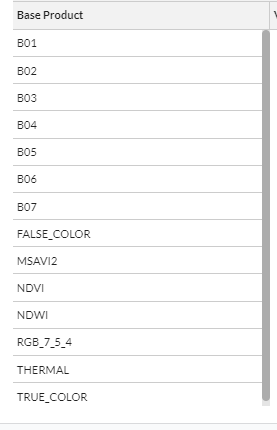Hello,
I’m interested to use Landsat 8 images level 2 (surface reflectance).
for collection in DataCollection.get_available_collections():
print(collection)
...
DataCollection.LANDSAT8
When I print information about this data collection seems like only level 1 is available :
DataCollection.LANDSAT8
>>> <DataCollection.LANDSAT8: DataCollectionDefinition(
api_id: L8L1C
catalog_id: landsat-8-l1c
wfs_id: DSS6
service_url: [https://services-uswest2.sentinel-hub.com](https://services-uswest2.sentinel-hub.com/)
collection_type: Landsat 8
processing_level: L1C bands: ('B01', 'B02', 'B03', 'B04', 'B05', 'B06', 'B07', 'B08', 'B09', 'B10', 'B11')
is_timeless: False
has_cloud_coverage: True )>
In additon to that, when I try to create new Landsat 8 level 2 layer, it seems like not all the bands are available:
How can I access this data collection?
Best regards
gmilcinski
June 6, 2021, 4:28pm
2
Hi @reutkeller ,
let me try to answer all your questions.
landsat-8-l1c is an old, now deprecated, Landsat Collection 1, which will cease to exist end of June, see forum post .
for Collection 2 you should use landsat-ot-l1 and landsat-ot-l2
WFS ids are DSS12 for Level 1 and DSS13 for Level 2 (see info )
It might be that sentinelhub-py is not yet supporting this collection, but it should be straightforward to add it on your side (pull requests are welcome as well!)
the “Base products” In configuration utility are just the most commonly used composites. You can easily configure a new composite by following these instructions . You will find a list of available bands here .
So… Landsat 8 Collection 2 is for sure supported by WMS.
1 Like
batic
June 7, 2021, 5:13am
3
The DataCollection for Landsat Collection are not yet (pre)defined in sh-py, but following the rules in example it is possible to do it yourself.
The code for LandSat8, Level1 product from Collection 2 is thus:
landsat8_l1 = DataCollection.define(
name = 'L8_C2_L1',
api_id = 'LOTL1',
catalog_id = 'landsat-ot-l1',
wfs_id = 'DSS12',
service_url = ServiceUrl.USWEST,
collection_type = 'Landsat Collection 2',
processing_level = 'L1',
bands = ('B01', 'B02', 'B03', 'B04', 'B05', 'B06', 'B07', 'B08', 'B09', 'B10', 'B11', 'BQA'),
has_cloud_coverage = True
)
2 Likes
Hi @batic , I get the name error from your script:
NameError: name ‘ServiceUrl’ is not defined
batic
June 13, 2021, 1:01pm
5
The ServiceUrl enum is defined in data_collections.py, so you need to import it first:
from sentinelhub.data_collections import ServiceUrl
ServiceUrl.USWEST
> 'https://services-uswest2.sentinel-hub.com'
The other possibility is to add url to the landsat8_l1 definition as
...
service_url = 'https://services-uswest2.sentinel-hub.com',
...
1 Like
@batic Thank you!
Thank you very much
batic
June 16, 2021, 11:05am
7
New version of sentinelhub-py was released yesterday, and these collections are now predefined.
Best of luck,
Thank you for your answer,
for collection in DataCollection.get_available_collections():
print(collection)
DataCollection.SENTINEL2_L1C
I suggest checking if you are using the correct version of the package. You can do that in the code with:
import sentinelhub
print(sentinelhub.__version__)
The new version is 3.3.1.
2 Likes

![]()
